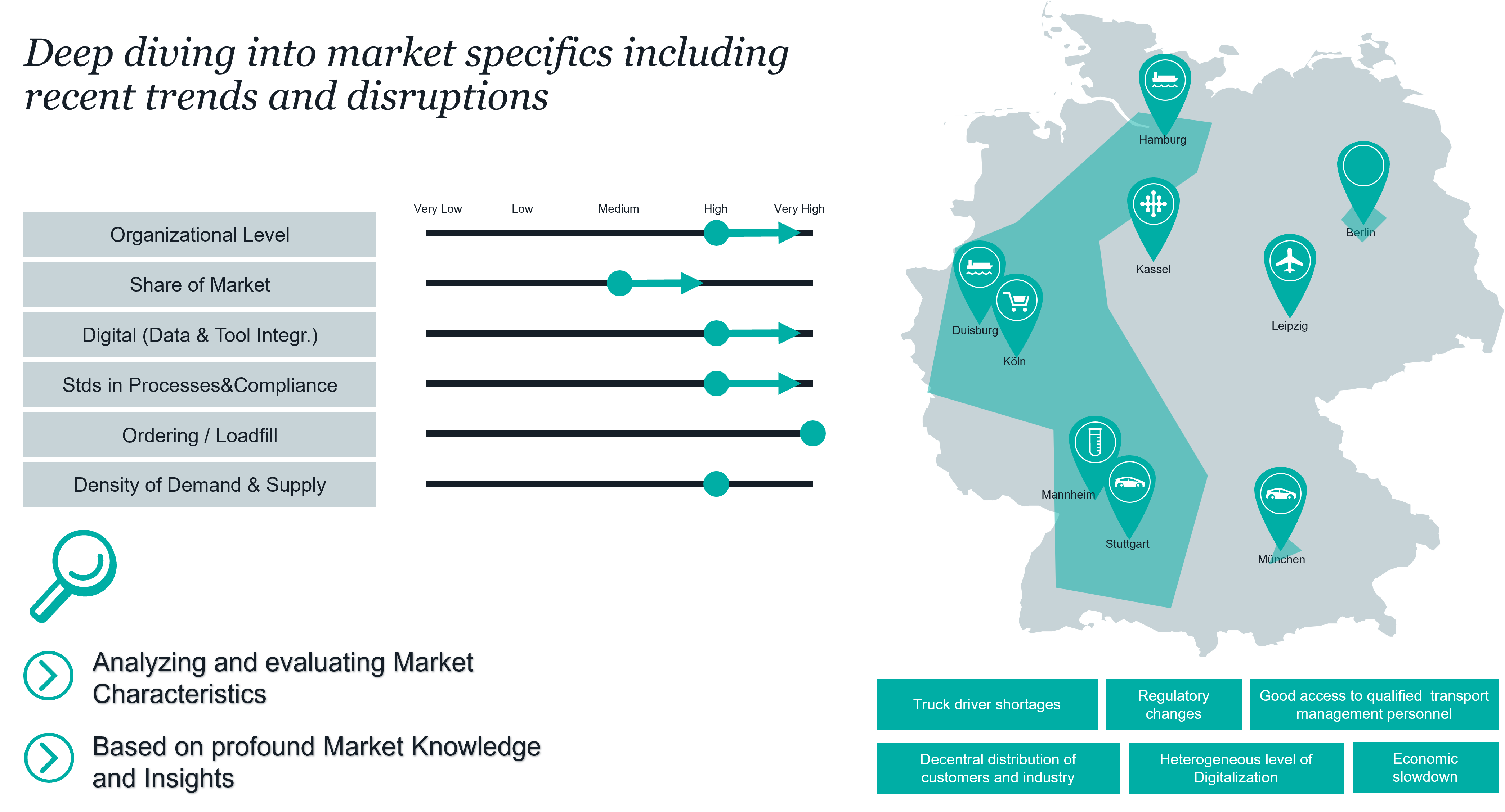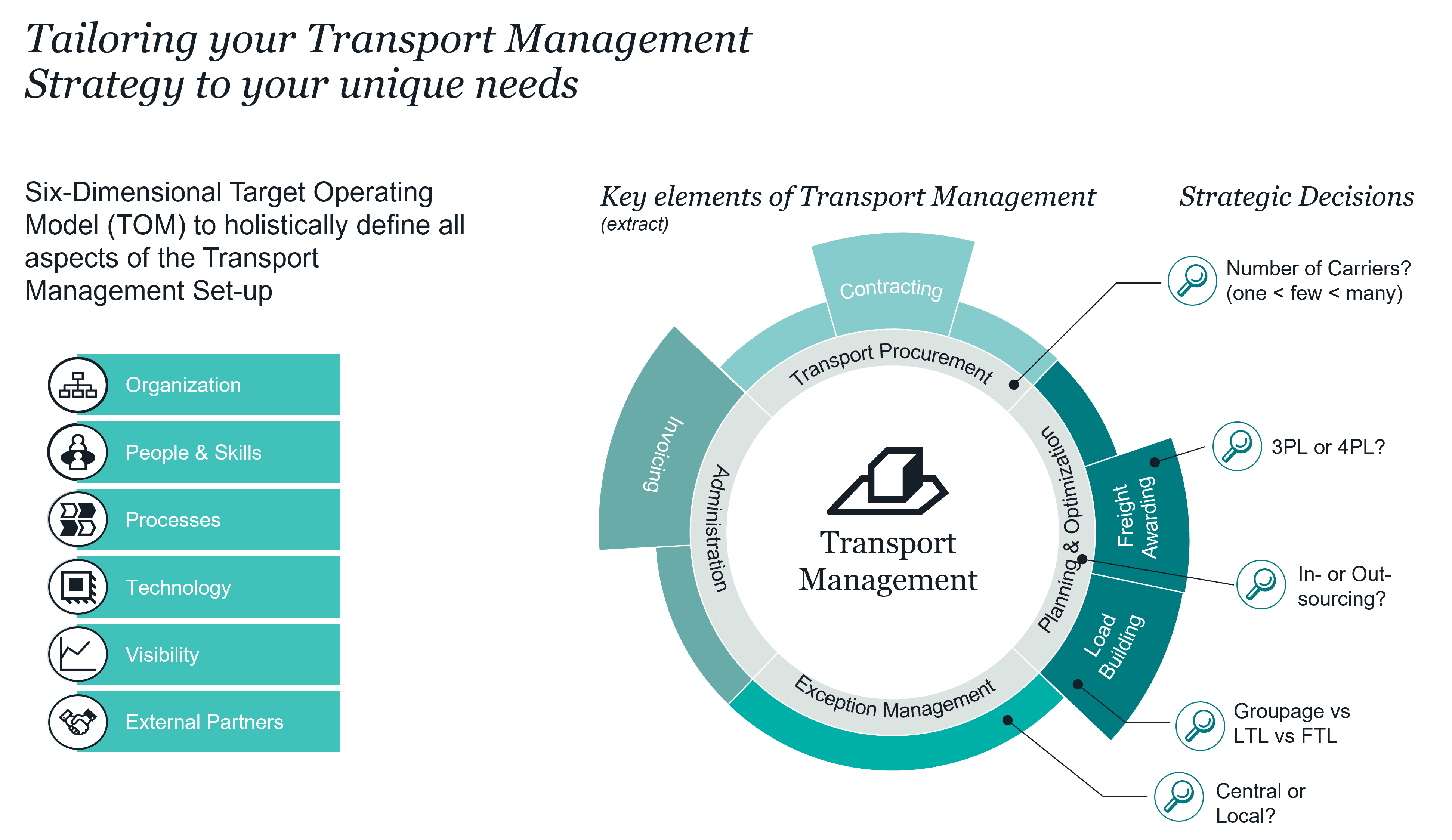Strategic Transport Management: Driving Efficiency, Resilience, and Cost Savings
13.06.2025
Supply chains are more complex than ever, challenging companies across industries to streamline their material flow and increase overall efficiency.
Despite the fact, that direct Transport Management costs only account for a small percentage of overall logistics expenses (mainly for overhead and IT), they have a huge impact on total transport spend (driven by freight costs), service levels, and sustainability performance. Without a strategic approach, businesses risk inefficiencies, high freight costs, and operational bottlenecks.
Our advice: Transport Management needs strategic guidance following and supporting the overarching corporate strategy in order to reach corporate and supply chain goals. We support you in designing and optimizing transport management strategies that align with your corporate goals and industry best practices. Our holistic approach ensures that your transportation network is cost-effective, service-driven, and future-proof.
Why Strategic Transport Management Matters
A well-structured transport management strategy goes far beyond cost-cutting, it enhances service quality, strengthens resilience, and ensures long-term competitiveness. Companies that take a proactive approach to strategic transport management achieve:
- Cost Optimization
Achieve up to 10% savings on total transport costs through optimized fill rates, shipment consolidation, routing, and transport rates as well as efficient management costs. - Service Excellence
Improve on-time delivery performance by up to 13% on time in full (OTIF), reducing missed service levels and increasing customer satisfaction. - Sustainability Impact
Reduce transport-related carbon emissions by implementing more efficient logistics strategies, such as load consolidation and low-emission transport modes. - Operational Efficiency
Reduce administrative workload through streamlined processes, automated freight invoicing, and digital tools. - Risk Mitigation
Strengthen supply chain resilience by diversifying carrier strategies, leveraging real-time data, and improving visibility.
Strategic transport management is a strategic lever for competitiveness and growth.
How to Set-up a Strategic Transport Management
Step 1: As-Is Assessment
- Understanding the current state: A deep dive into existing transportation structures, processes, and cost drivers
- Technology assessment: Evaluating the TMS (Transport Management System) and IT landscape to ensure strategic fit
- Data-driven insights: Leveraging shipment data, cost structures, and performance metrics to identify immediate improvement potential
- Market assessment: Analyzing Key Market Characteristics impacting the definition of appropriate strategies per market.

Fig. 2: Analysis of Key Characteristics of your Markets (exemplary)
Step 2: To-Be Analysis
- Defining future scenarios: Developing multiple scenarios to assess different transport strategies and operating models
- Strategic decision-making: Mapping key elements and design options for transport management. E.g., Should transport management be centralized or decentralized? Should a company leverage a 3PL or a 4PL model?
- Benchmarking against industry best practices: A comparison with market leaders to uncover gaps and inefficiencies
Step 3: To-Be Design
- Building the optimal transport operating model: Creating a structured decision framework to determine the best carrier strategy, operating model, and cost structure
- Process design and digitalization roadmap: Establishing the right governance, workflows, and IT tools to support transport operations
Step 4: Business Case & Implementation Roadmap
- Financial validation: High level assessment of expected cost savings, efficiency gains, and service level improvements and impact on resilience. Combined quantitative and qualitative approach.
- Implementation roadmap: Providing a clear, step-by-step plan for rolling out the optimized transport strategy
- Stakeholder alignment: Ensuring all relevant teams, from procurement to operations, are aligned on execution
This structured approach enables companies to achieve measurable and sustainable improvements in transport performance, costs, and resilience.
Why Choose Miebach to Support you in Strategic Transport Management?
With decades of experience in supply chain optimization and a global network of industry experts, Miebach is the ideal partner to support you:
- Define the right Transport Management Strategy, reduce transport costs while maintaining or improving service levels and resilience
- Design a future-proof operating model tailored to specific market and business needs
- Establish a strategic framework to guide the design of your global transportation management set-up
- Support the implementation / roll-out with dedicated experts
What are Common Challenges in Transport Management?
Many companies struggle with hidden inefficiencies in their transport network. While costs might seem under control at a high level, suboptimal planning, procurement, IT systems, and administration can lead to significant financial and operational setbacks.
Planning & Optimization Challenges
- High freight costs due to poor shipment aggregation and underutilized truck capacity
- Inefficient route planning leading to longer transit times and higher mileage
- Limited service level control, resulting in customer dissatisfaction and penalties
- Lack of data visibility, making it difficult to assess transport performance
Procurement & Carrier Strategy Challenges
- Low standardization of carrier contracts, leading to complexity, inefficiencies and higher costs
- Unclear operating model choices – should we use a 3PL or 4PL model? A single strategic partner or multiple carriers?
- Misaligned incentives in contracts that reduce transport efficiency
- Imbalanced risk allocation between stakeholders, leading to cost overruns and service disruptions
IT & Technology Challenges
- Lack of integration between ERP, TMS (Transport Management System) and adjacent systems
- Insufficient real-time tracking and analytics, limiting transparency and decision-making
- Outdated systems that fail to support dynamic transport optimization
- Missing or not utilized functionalities that hinder execution and service levels
Administrative Challenges
- Time-consuming freight invoicing processes that create unnecessary costs and errors
- Too many exceptions and outliers, requiring excessive manual intervention
- Lack of automation, leading to inefficiencies in cost control and compliance
Addressing these challenges requires a strategic approach that combines organizational structures, processes, partnerships, data and technology in a holistic way.

Fig. 1: Our Holistic Approach to Transport Strategy Optimization
We support you in defining and optimizing your transport strategy. We take a structured, data-driven approach to transform your transport management. Our projects are tailored to the unique needs of your company, ensuring measurable and sustainable improvements.
Let’s move your supply chain management forward. Contact us to learn how we can transform your transport management!
Contact




